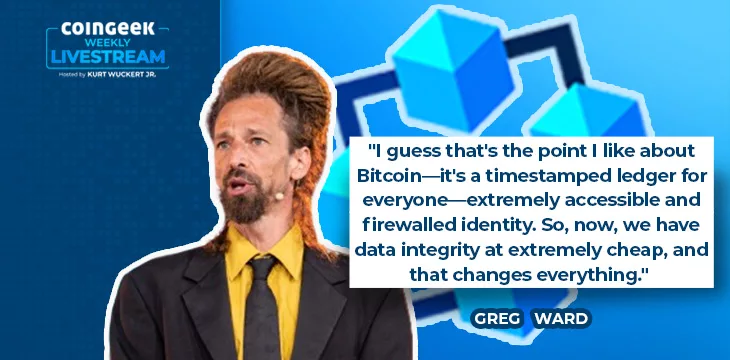
|
Getting your Trinity Audio player ready... |
On episode seven, season four of the CoinGeek Weekly Livestream, Greg Ward from
SmartLedger Solutions joined Kurt Wuckert Jr. to talk about the environmental impact of blockchains, how immutable logs can change cybersecurity and the world, and many other BSV blockchain-related matters.
The environmental impact of blockchains
Ward is interested in the environmental impact of blockchains. He and the SmartLedger team have put together a comparison of proof-of-work (PoW) blockchains and their impact. It also explains why the incentives of PoW chains are necessary and how proof-of-stake chains are vulnerable to Sybil attacks.
Satoshi said nodes would end up in data centers, Ward reminds us. A peer-to-peer cash system requires scalability to experience what early users did with their laptops. BTC crafted the digital gold and scarcity narratives, but Ward wonders why we can’t have that and all the utility of BSV. Having all that utility would certainly make the environmental impact more justifiable.
Serious problems for BTC
Aside from its lack of utility, BTC suffers from other serious problems. If the price doesn’t double every halving, fees have to go up, which will further mess with the user experience. While it’s already going up as this halving approaches, confirming their theory in their minds, this can’t go on forever.
Wuckert highlights how, as the transaction fees go up, stranded UTXOs become a problem. He says he has pointed this out to some BTCers, who have shut him down or accused him of trying to scare them. They are now talking about low-fee days to consolidate UTXOs.
Ward notes how the subsidy is just that—a subsidy. Transaction fees were supposed to take over. However, with both the Lightning Network and ETFs acting as layer twos, starving miners of revenue, the much-touted miner death spiral seems inevitable.
Wuckert draws an analogy with restaurants. While high-end ones might appeal to middle-class and wealthy people in specific jurisdictions, McDonald’s (NASDAQ: MCD) has a more global appeal. BTC is like the former, while BSV is similar to the latter in this way.
Ward draws attention to the changing narrative of BTC over time. It started with anarchists fighting for decentralization, and many of those people are now celebrating the entry of
BlackRock and others because the fiat value of their coins went up.
Logging systems and their utility
Wuckert says that what stood out to him in the COPA v Wright trial was Dr. Craig Wright and his witnesses all talking about the benefits of immutable logs and how they helped their businesses. The COPA side laughs because they think these people do not understand blockchains and their purpose. Dr. Wright even used Certihash as an example of what he was trying to do at various banks.
Speaking of Certihash, Ward says things have been going great. They’re onboarding new clients, and everyone is learning from integrating systems with the BSV blockchain. For many clients, having an immutable log is a game changer. Certihash is one piece, but there are others being developed to handle the identity of resources for the recovery of assets.
Wrapping up, Ward says everyone has value and Assets Under Management (AUM), it’s called their data. With Bitcoin, users can monetize their own data instead of enabling the likes of Meta (NASDAQ: META) to make billions from it.
Wuckert agrees, noting that micropayments make paying people tiny amounts practical for the first time. He believes that big players like Meta will begin using them at some point or will risk becoming obsolete. Drawing on his experience receiving monthly payouts on X, Wuckert says micropayments can lower the threshold, allowing everyone to become a creator and get paid for valuable content.
Watch: Natural resources, sustainability and blockchain at CoinGeek Zurich

 11-21-2024
11-21-2024


